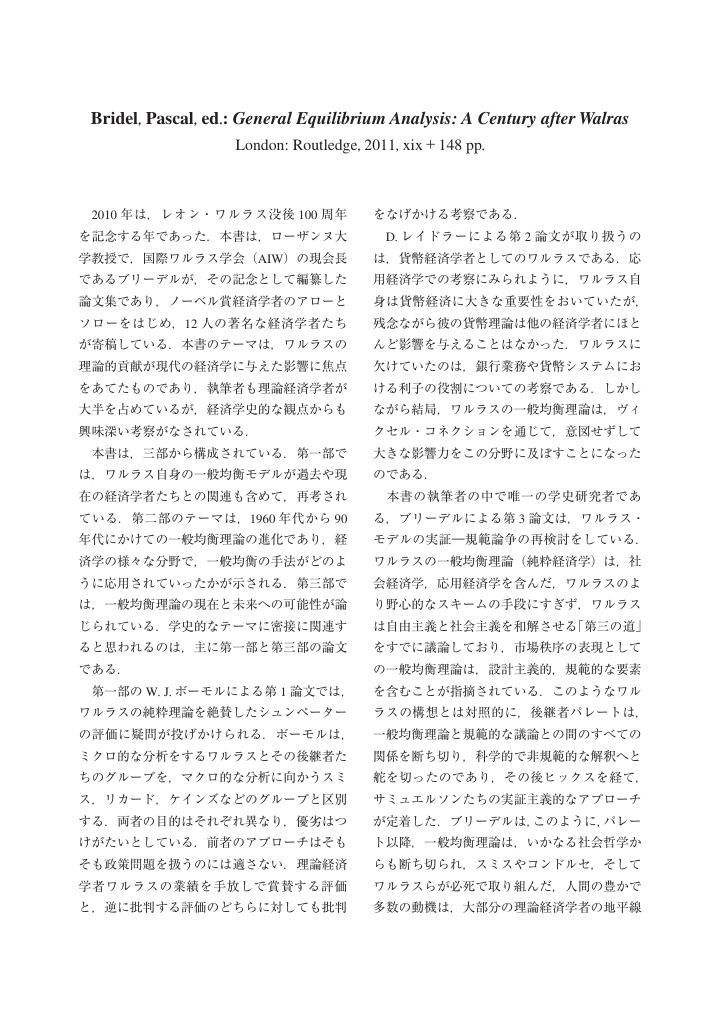11 0 0 0 OA ワルラスと国家
- 著者
- 御崎 加代子
- 出版者
- The Japanese Society for the History of Economic Thought
- 雑誌
- 経済学史学会年報 (ISSN:04534786)
- 巻号頁・発行日
- vol.30, no.30, pp.55-62, 1992 (Released:2010-08-05)
- 参考文献数
- 13
Léon Walras founded his Political Economy on the idea of “equality” of the French Revolution. He concluded the economic inequality principally resulted from the landownership, and the solution he gave to this problem was the nationalization of land.Concerning the equality between the capitalist and working classes, Walras belived the free competition would realize that in a double sense. First, it would cause the assimilation of the two classes, which means “the equality in fact”. And secondly, the free competition would play the role of the imparitial and transcendental judge in the determination of the rate of wage and interest, which would bring “the equality in right” of the two classes.But Walras's concept of free competition was not only an “ideal type ” based on an obsevation of the real economic order but also a norm which was to be realized universally.His “économie politique appliquée” was given the role of organizing the free competition in a society on the basis of the conclusion of his “économie politique pure”, but regarding the labour market, he could not show concretely how to organize the free competition.Moreover, Walras's entrepreneur, which the state should take on in the real world, was expected to realize the idea of equality by observing the just output so that no “bénéfice” could be gained.
5 0 0 0 OA ワルラスからシュンペーターへ ―アントレプレナーシップの歴史的・思想的背景―
- 著者
- 御崎 加代子
- 出版者
- 特定非営利活動法人 組織学会
- 雑誌
- 組織科学 (ISSN:02869713)
- 巻号頁・発行日
- vol.56, no.2, pp.4-14, 2022-12-20 (Released:2023-03-01)
- 参考文献数
- 17
本論文の目的は,イノベーション論の元祖とされるシュンペーターの企業者概念の特徴と意義を,彼が最も影響を受けた経済学者ワルラス,さらにはその源流に位置するJ.B. セーやカンティロンなど,フランスにおける企業者概念の歴史から考察し,現代のアントレプレナーシップ論の歴史的・思想的背景を明らかにすることである.またシュンペーターとよく比較されるカーズナーの企業家論についても,ワルラス批判という観点から考察する.
3 0 0 0 ワルラス応用経済学研究-一般均衡理論の制度的枠組の思想史的解明
一般均衡理論の制度的枠組としてのワルラス応用経済学の意義を、思想史的なアプローチで解明するという研究目的を遂行するために、まずはワルラス応用経済学における競争概念を、ハイエク的な視点から再考することにとりくんだ。ハイエクは、ワルラスの純粋経済学に由来する新古典派的な競争概念を、社会主義経済計算論争の後、「設計主義」に結び付けて批判した。本研究では、そのときに彼が設計主義の源泉とした「フランスの伝統」に着目した。そしてワルラスの純粋経済学ではなく、応用経済学の競争概念「組織された自由競争」に注目し、それを、ハイエクの言う「フランスの伝統」を代表するデカルト主義やサン=シモン主義に照らして、その特徴を再考すると、ワルラスは、ハイエクの定義する設計主義者であるどころか、むしろハイエクと近い主張をしており、ワルラスの競争概念は、一般1的な新古典派の競争概念とも異なる独自性を持っていることが明らかになった。そのことをさらに検証するために、ワルラスの応用経済学を、サン=シモン主義からの影響だけではなく、より広い意味でのフランスの伝統の中で、考察することにとりくんだ。すなわち、ケネー、カナール、J.Bセー、サン=シモン、デュピュイ、クルノーを中心とした18-19世紀フランス経済学史の流れを、ワルラス応用経済学における「組織された自由競争」概念の形成過程として読み込み、同概念の独自性と思想的意義を明らかにした。その際に、マルクスやシュンペーター・が考える「フランスの伝統」とハイエクのそれとを比較検証し、フランス経済学史についての既存の解釈に対しても、異なる見解をうちたてた。すなわち、ワルラス経済学をステレオタイプ的な新古典派的な解釈から解放するためには、フランス経済学史研究そのものに新しい光を投じる必要があるのである。
2 0 0 0 IR ワルラスのマルクス批判 : 企業者国家論を中心に
- 著者
- 御崎 加代子
- 出版者
- 滋賀大学経済学部
- 雑誌
- 滋賀大学経済学部研究年報 (ISSN:13411608)
- 巻号頁・発行日
- vol.22, pp.27-35, 2015
This paper aims to clarify Walras's ideas of entrepreneurship and the State by focusingparticular attention on his criticism of Marx in chapter 5 'Theory of property' in Studies inSocial Economic(1896). Based on the idea of the zero-profit entrepreneur presented in his pure economic model(the general equilibrium theory), Walras developed his views on collectivism in his socialand applied economics, and defined it as a system where the State takes over the role ofthe entrepreneur. He classified Marx's scheme also as collectivism, and tried to clarify itspractical difficulties and impossibilities. Contrary to the textbook interpretation, Walras didnot regard the difference in their theories of value as a crucial point to criticize Marx. Walras concluded that Marx gave priority to justice, that is to say, the prevention of anyexploitation by the private capitalist entrepreneur, by sacrificing economic advantage. Walrasbelieved he could realize his own style of collectivism where justice and economic advantagecould be achieved together. If we ignore Walras's thinking in areas other than pure economics, and if we hold to thetextbook interpretation about the antagonism between the Marxian and Walrasian schools,we then lose sight of the real implications and significance of Walras's pure economic theory.
- 著者
- 御崎 加代子
- 出版者
- The Japanease Society for the History of Economic Thought
- 雑誌
- 経済学史研究 (ISSN:18803164)
- 巻号頁・発行日
- vol.59, no.1, pp.107-108, 2017 (Released:2019-10-12)
- 著者
- 御崎 加代子
- 出版者
- 経済学史学会
- 雑誌
- 経済学史研究 (ISSN:18803164)
- 巻号頁・発行日
- vol.58, no.2, pp.92-94, 2017 (Released:2019-11-30)
- 著者
- 御崎 加代子
- 出版者
- 経済学史学会
- 雑誌
- 経済学史研究 (ISSN:18803164)
- 巻号頁・発行日
- vol.54, no.2, pp.79-80, 2013 (Released:2019-10-31)
- 著者
- 御崎 加代子
- 出版者
- The Japanease Society for the History of Economic Thought
- 雑誌
- 経済学史研究 (ISSN:18803164)
- 巻号頁・発行日
- vol.49, no.1, pp.192-193, 2007-06-30 (Released:2010-08-05)
1 0 0 0 OA 『ワルラス父子経済学著作全集』と『ワルラス研究』
- 著者
- 御崎 加代子
- 出版者
- 経済学史学会
- 雑誌
- 経済学史研究 (ISSN:18803164)
- 巻号頁・発行日
- vol.48, no.1, pp.139-142, 2006-06-30 (Released:2010-08-05)
- 著者
- 御崎 加代子
- 出版者
- The Japanese Society for the History of Economic Thought
- 雑誌
- 経済学史学会年報 (ISSN:04534786)
- 巻号頁・発行日
- vol.42, no.42, pp.165-167, 2002 (Released:2010-08-05)
- 参考文献数
- 7
- 著者
- 御崎 加代子
- 出版者
- The Japanese Society for the History of Economic Thought
- 雑誌
- 経済学史学会年報 (ISSN:04534786)
- 巻号頁・発行日
- vol.35, no.35, pp.178-180, 1997 (Released:2010-08-05)






